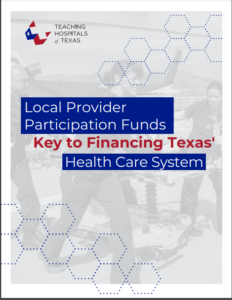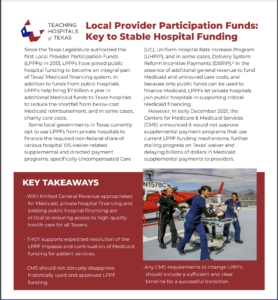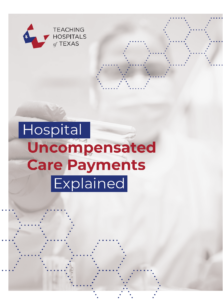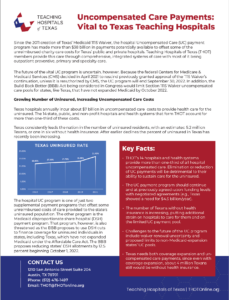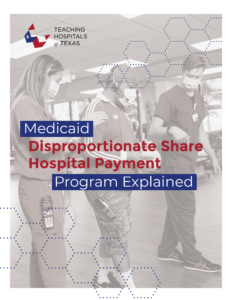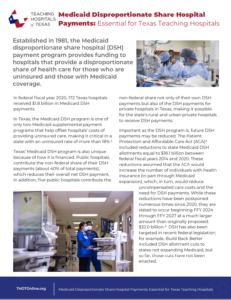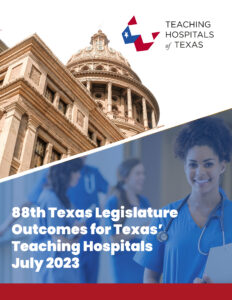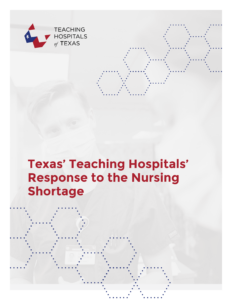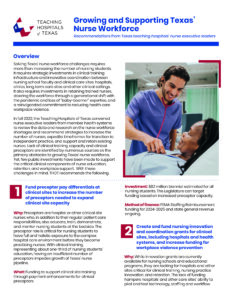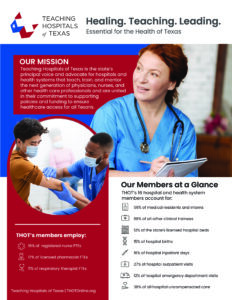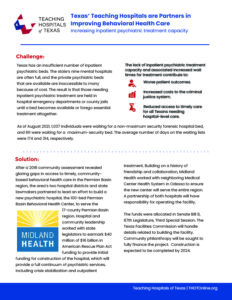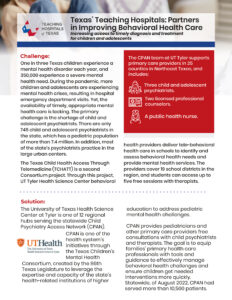Local Provider Participation Funds: Key to Financing Texas’ Health Care System
Some local governments in Texas currently opt to use Local Provider Participation Funds (LPPFs) from private hospitals to finance the required non-federal share of various hospital 1115 waiver related supplemental and directed payment programs, specifically ncompensated Care (UC), Uniform Hospital Rate Increase Program (UHRIP), and in some cases, Delivery System Reform Incentive Payments (DSRIP). 1 In the absence of additional general revenue to fund Medicaid and uninsured care costs, and because only public funds can be used to finance Medicaid, LPPFs let private hospitals join public hospitals in supporting critical Medicaid financing.
Local Provider Participation Funds: Key to Stable Hospital Funding
Since the Texas Legislature authorized the first Local Provider Participation Funds (LPPFs) in 2013, LPPFs have joined public hospital funding to become an integral part of Texas’ Medicaid financing system. In addition to funds from public hospitals, LPPFs help bring $7 billion a year in additional Medicaid funds to Texas hospitals to reduce the shortfall from below-cost Medicaid reimbursement, and in some cases, charity care costs.
Hospital Uncompensated Care Payments Explained
Since the 2011 creation of Texas’ Medicaid 1115 Waiver, the hospital Uncompensated Care (UC) payment program has made more than $38 billion in payments potentially available to Texas’ public and private hospitals to offset some of their unreimbursed charity care costs. Texas hospitals reported $7 billion in unreimbursed charity care costs in 2021 alone. As the number of uninsured Texans remains persistently high – currently 21.4 percent of the population, or 5.2 million – UC payments to offset some of the costs of their care are essential.
Uncompensated Care Payments: Vital to Texas Teaching Hospitals
Since the 2011 creation of Texas’ Medicaid 1115 Waiver, the hospital Uncompensated Care (UC) payment program has made more than $38 billion in payments potentially available to offset some of the unreimbursed charity care costs for Texas’ public and private hospitals. Teaching Hospitals of Texas (THOT) members provide this care through comprehensive, integrated systems of care with most of it being outpatient preventive, primary and specialty care.
Medicaid Disproportionate Share Hospital Payment Program Explained
Established in 1981, the Medicaid disproportionate share hospital payment program provides funding to hospitals that provide a disproportionate share of a state’s care for those who are uninsured and those with Medicaid. In Texas, the Medicaid DSH program is one of only two Medicaid supplemental payment programs that help support hospitals’ costs of providing uninsured care, making it critical in a state with an uninsured rate of more than 18 percent.
88th Texas Legislature Outcomes for Texas’ Teaching Hospitals July 2023
The 88th Texas Legislature began as the three-year anniversary of the global COVID-19
pandemic loomed. The session ended just as the federal public health emergency declaration
expired. Bookended by these two significant dates, the legislative session mirrored the impact
COVID-19 had on our health care institutions, our health care workforce, and our communities.
The pandemic cast a long shadow on the Texas Capitol, and lawmakers’ health care priorities
and proposals – both positive and negative – reflected their understanding of how hospitals
weathered the pandemic.
Recommendations from Texas teaching hospitals’ nurse executive leaders
Building on work conducted in 2021 and 2022 on nursing workforce challenges, the Teaching Hospitals of Texas convened nurse executive leaders from member health systems in the summer of 2022 to review the data and research on the nurse workforce shortages and recommend strategies to increase the number of nurses, expedite timeframes for transition to independent practice, and support and retain existing nurses.
Teaching Hospitals of Texas: An Overview
Formed in 1986, Teaching Hospitals of Texas (THOT) is a 501(c)(6) non-profit association of state, public and non-profit hospitals and health systems committed to providing access to quality health care for all Texans and to training the next generation of physicians, nurses and allied health personnel.
Clinical and Collaborative Investments in Texas’ Nursing Workforce: The Needed Paradigm Shift
Based on a review of the published literature and real-world experience, the executive nurse leaders of the member hospitals that comprise the Teaching Hospitals of Texas developed specific recommendations and identified possible funding vehicles to target and address challenges driving the state’s nurse workforce shortage.
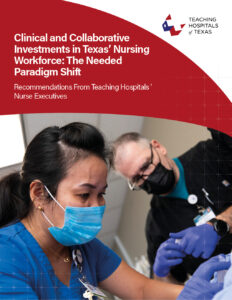
Increasing Inpatient Psychiatric Treatment Capacity
Texas has an insufficient number of inpatient psychiatric beds. The state’s nine mental hospitals are often full, and the private psychiatric beds that are available are inaccessible to many because of cost. The result is that those needing inpatient psychiatric treatment are held in hospital emergency departments or county jails until a bed becomes available or forego essential treatment altogether.
The lack of inpatient psychiatric treatment capacity and associated increased wait times for treatment contribute to:
- Worse patient outcomes.
- Increased costs to the criminal justice system.
- Reduced access to timely care for all Texans needing hospital-level care.
Improving Access to Timely Care for Children and Adolescents
To help address the immediate needs for earlier diagnosis and intervention for children and adolescents, THOT member, the University of Texas Health Science Center at Tyler participates in two initiatives of the Texas Children’s Mental Health Consortium: the Child Psychiatry Access Network and the Texas Child Health Access Through Telemedicine.

